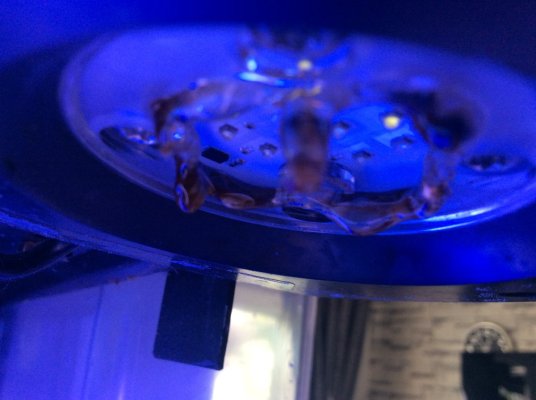Many enthusiasts have long favored LEDs over T5s, citing the belief that while T5 bulbs require annual replacement, LEDs will remain robust for over a decade. But where did this enduring myth about the infinite lifespan of LEDs originate?
Prominent manufacturers such as Kessil highlight a life expectancy of 35,000 hours for their lights, which translates to around 5-7 years for the average user. Similarly, Philips' coral care lights advertise 25,000 hours at full light output, amounting to just 2.5 years or up to 5 years if operated for 12 hours daily.
Considering the quality reputation of these brands, one might infer that other less renowned brands might offer even shorter lifespans. A notable observation from a forum memeber mentioned that the Red Sea ReefLed 90, which originally emitted 800 par directly underneath when new, declined to 600 par after just two years.
Moreover, there have been accounts of hobbyists who, upon integrating a second identical LED unit, observed noticeable discrepancies in brightness even with identical settings.
This evidence suggests that LEDs, akin to traditional bulbs, experience degradation over time, with shifts in spectral output mirroring that of bulbs and tubes. Contrary to popular belief, studies by BRS have shown that T5 tubes can function effectively for more than 18 months before requiring replacement. Furthermore, they offer superior light spread compared to other sources. This accentuates the argument that LED fixtures dont really provide value for their cost. If one were to compare, they'd only need three sets of T5 bulb replacements over the lifespan of an average LED fixture and would likely achieve superior results, especially with specific corals like sps.
Prominent manufacturers such as Kessil highlight a life expectancy of 35,000 hours for their lights, which translates to around 5-7 years for the average user. Similarly, Philips' coral care lights advertise 25,000 hours at full light output, amounting to just 2.5 years or up to 5 years if operated for 12 hours daily.
Considering the quality reputation of these brands, one might infer that other less renowned brands might offer even shorter lifespans. A notable observation from a forum memeber mentioned that the Red Sea ReefLed 90, which originally emitted 800 par directly underneath when new, declined to 600 par after just two years.
Moreover, there have been accounts of hobbyists who, upon integrating a second identical LED unit, observed noticeable discrepancies in brightness even with identical settings.
This evidence suggests that LEDs, akin to traditional bulbs, experience degradation over time, with shifts in spectral output mirroring that of bulbs and tubes. Contrary to popular belief, studies by BRS have shown that T5 tubes can function effectively for more than 18 months before requiring replacement. Furthermore, they offer superior light spread compared to other sources. This accentuates the argument that LED fixtures dont really provide value for their cost. If one were to compare, they'd only need three sets of T5 bulb replacements over the lifespan of an average LED fixture and would likely achieve superior results, especially with specific corals like sps.



















